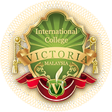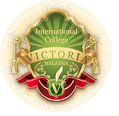Certificate Courses in Malaysia
Summary Program
Recognised as one of Asia's leading destinations for education, Malaysia is all set to embark on a drive to be the global education destination by 2025. In International higher education domain, Malaysia has received the distinction of being the 11th most popular destination in the world.
Situated in SouthEast Asia, Malaysia is a beautiful country split into two parts by the South China Sea. Peninsular Malaysia is the hub of education while East Malaysia is more popular for its quiet and scenic beauty.
The multiethnic population and a fast growing economy add to the charm of this country rich in natural resources.
According to Quacquarelli Symonds (QS) World University rankings for 2018, five universities in Malaysia have been ranked among the top best 300 in the world. Not surprisingly, there is a growing population of international students in Malaysian universities. The high quality of education available in Malaysia is the main reason why 172,886 international students have chosen to study here. The lower cost of living, multi-culture and multilingual population, and good quality of life are added benefits.
The government supports free education for six years at primary level and five years at secondary level. Sijil Pelajaran Malaysia (SPM) exam has to be taken if higher education is desired. Students who clear the SPM exam can opt to take up certificate courses or get a pre-university qualification such as matriculation or sixth form.
Certificate course in Malaysia are one of the higher education programs that are available in a wide selection of specialisations.
Eligibility for certificate programs
Certificate programs in Malaysia can be taken up by students who are 17 years old or above since certificate programs come under the category of higher education.
Also, in public universities, the minimum qualification to be eligible for certificate programs is taking the SPM or IGCSE exam or O level with 1 credit.
Where can certificate courses be taken up?
Varied certificate courses are offered by the following type of institutions in Malaysia
- Government-funded public universities
- Polytechnics
- Public colleges
- Private higher educational institutions such as private colleges
- Private universities and university colleges
- Foreign university branch campuses
The Malaysian Qualifications Agency implements the Malaysian Qualifications Framework (MQF) which specifies the criteria for awarding certification. The criteria are in terms of minimum credits required for the award and for certificate programs, a minimum of 60 credits have to be accrued.The MQF also sets the standardized and unified system to ensure quality and standard of higher education based on a defined set of criteria that include learning outcomes, credit, objectives, and field of study.
Types of certificate courses
For students who have SPM or 0 levels with no credits, the vocational skills certificates are the best option.
Skills sector awards the skills certificates. Vocational & Technical sector awards the vocational and technical certificates. Higher education sector provides the Level 3 certificates.
The Malaysian Skills Certification System or Sistem Persijilan Kemahiran Malaysia is a certification program regulated by the Department of Skills Development previously called vocational training council. The system provides vocational skills certificate for candidates who meet the skill criteria of the National Occupational Skills Standard.
Five levels of awards are available in this program. Levels 1 to 3 are certification programs and are based on progressing levels of complexity, while Levels 4 and 5 are advanced diplomas.
For those with SPM credits 1-2, options for taking up certificate courses are available in various colleges including:
- Administrative Skills
- Information & Communication Technology Certificate in Communication Studies at IACT College
- Creative Design
- Business Administration
- IT
- Health Science
Other certificate courses offered by both public and private institutions are in the following domains:
- Arts and Design
- Economics
- Education
- Humanities
- Journalism and Mass Communication
- Languages
- Marketing
- Hotel and Catering Management
- Business Studies
- Travel Operations
- Legal Practice
- Culinary Arts
- Audio Production
After completing the certificate course, students can further take up a diploma in the same field for another two years depending on the field of study.
Fees and duration
The fees and duration depend on the field of study. The approximate average fee for an international student for a certificate program of 18 months' duration is USD 3000.
Most certificate courses are taught for a period of 12 to 18 months and are full-time courses.
Most certificate courses have commencement dates in January, April, May, and August. Some colleges or universities also offer flexible intakes throughout the year depending on the field of study.
Short course certificates
Short course certificates are also offered by various institutions in specialized skills. Such certificates are intended for professionals in the particular industry who wish to upgrade their skills and knowledge levels.
Both local and international students can apply for and take up the specialized certificate programs. The eligibility criteria for the courses taught in English is an IELTS score of minimum 6, and work experience in relevant field. For some certificate programs, undergraduate and postgraduates are also eligible to apply. Some of these certificate courses include:
- Creative writing
- Competency in heating, ventilation, and air-conditioning
- Programmable logic
- Competency in Fundamental E & I for oil and gas facilities
- Project management
- Certification for Dental Surgery assistants
- Renal nursing
- Automotive technology
- Cabin Crew preparation
- Early childhood care and education
Choosing the right college for certificate courses
When choosing the college or university for certificate programs, the following points should be considered:
- Trained faculty: Explore if the college or university has trained and experienced faculty in your field of study. For some fields, high level of expertise is required.
- Infrastructure: Laboratories, libraries, cafeteria, and Internet connectivity are some of the infrastructure details to look into before selecting the college
- Industry collaborations: Colleges that have excellent industrial tie-ups and placement services are the ones to shortlist.
- Higher studies: If you want to advance your studies from certificate courses, look at colleges or universities that offer more options after completing the certification programs. These can include diploma courses, degrees or postgraduate studies depending on the field chosen.
- Friendly cross-cultural environment: A healthy mix of different cultures and ethnicity provides a vibrant environment for learning and developing social skills.

SIGN UP NOW FOR
+60149370985
+60166822047
SILA ISIKAN BORANG PERMOHONAN

SIGN UP NOW FOR
+60149370985
+60166822047
Please fill the Scholarship form


 Malay
Malay English
English